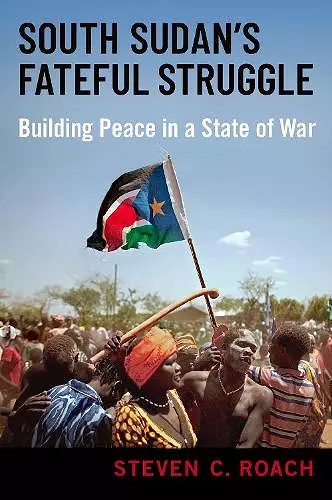South Sudan's Fateful Struggle
Building Peace in a State of War
Format:Hardback
Publisher:Oxford University Press Inc
Published:23rd Jan '24
Currently unavailable, and unfortunately no date known when it will be back

The Comprehensive Peace Agreement marked the end of Sudan's second civil war between the North and South. But in creating an autonomous southern region and a pathway toward statehood, it failed to resolve the effects of rebel factionalism, party infighting, and corruption in the South. In South Sudan's Fateful Struggle, Steven C. Roach analyzes these persistent effects of the South-South war, showing how they disrupted the transition to statehood and divided the transitional government of national unity in South Sudan. Throughout, he stresses the centrality of elite mismanagement and the durable dynamics of war which have shaped the country's troubled political destiny. The government, plagued by patronage-fueled corruption and patrimonialism, continues to rely on the threat of violence to govern the country and to delay the transition to a new government of national unity. Roach argues that in naturally sowing division and distrust, government elites must ultimately learn to engage civil society to achieve long-term peace, accountability, and justice. Along with providing an overview of the country's trajectory in this century, Roach traces its state of war to colonial times and uses the notion of militarized patronage to describe the distinct nature of South Sudan's patronage networks. He shows how the Sudan People's Liberation Movement came to dominate the country's affairs to become a powerful deterrent to democracy, security, justice, and national unity. He then discusses the promising efforts by civil society actors to advance hybrid justice by pressuring the government to implement a truth commission, a war crimes court, and reparations commission. Comprehensive in scope, the book represents the first systematic examination of South Sudan's quandary both before and after its civil war.
Steven C. Roach offers a piercing analysis of South Sudan's complicated history of hope, uncertainty and war as the South Sudanese seek to build a modern state in the aftermath of the landmark referendum of 2011. Roach's valuable insights are well-presented and the book provides an excellent perspective on an important subject that should concern us all. * Christopher Zambakari, Founder & CEO, The Zambakari Advisory L.L.C *
In South Sudan's Fateful Struggle, Steven Roach presents the compelling case that the legacy of South-South war not only exacerbated ethnic violence and promoted the breakdown of law and order in South Sudan but continues to shape the political culture of its political class. Roach offers an innovative approach to the question of why South Sudan has reproduced the ugliness of its political history after declaring its independence in 2011. Tracing the history and politics of state formation and national liberation movement in South Sudan, Roach explains how the political violence and human sufferings that have occurred over the past decade, including ethnic violence, human rights abuses, and the proliferation of a culture of impunity and corruption, can only be understood considering this bitter legacy. * Amir H. Idris, Professor of African History and Politics, Fordham University (Lincoln Center Campus) *
South Sudan's Fateful Struggle is a comprehensive investigation into South Sudan's civil war, tracing the challenges of fashioning a state from disparate communities and competing elites. Reflecting back through history the work sets out the trajectory for South Sudan since independence. Importantly, the work develops a concept of militarized patronage to explain the challenges and failures to build the world's newest state. Not all pessimism, however, the work explores the potential present with opportunities for hybrid justice and to pressure the government to implement a truth commission, war crimes court, and reparations commission. This is an important contribution to understanding South Sudan and state emergence more broadly and will be interesting to policy makers and scholars alike. * Matthew LeRiche, Director Global Leadership Center, Assistant Professor Global Studies, Ohio University *
A superb, well-documented analysis. * Choice *
South Sudan's Fateful Struggle: Building Peace in a State of War, offers a brilliant perspective and is an eye opener to the many historical and contemporary drivers of the protracted conflict. The book finds its place among the few that offer a unique perspective on how the crisis can be understood and resolved. * Australian Outlook, Australian Institute of International Affairs *
South Sudan's Fateful Struggle is a significant contribution to the literature on South Sudan's political struggles and the broader field of conflict resolution. Roach's concept of "militarized patronage" offers a new perspective on the link between corruption and conflict, making the book valuable for scholars, policymakers, and anyone interested in state-building in post-conflict societies. * The Journal of Social Encounters *
ISBN: 9780190057848
Dimensions: 236mm x 163mm x 22mm
Weight: 576g
264 pages